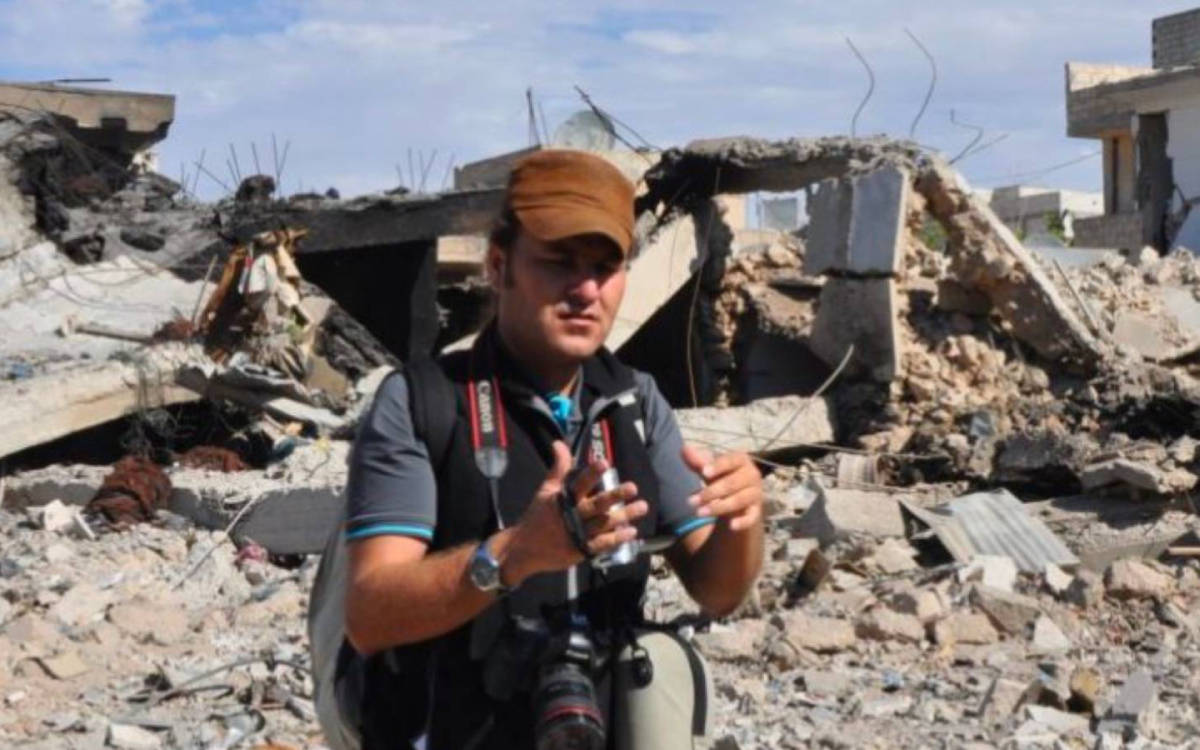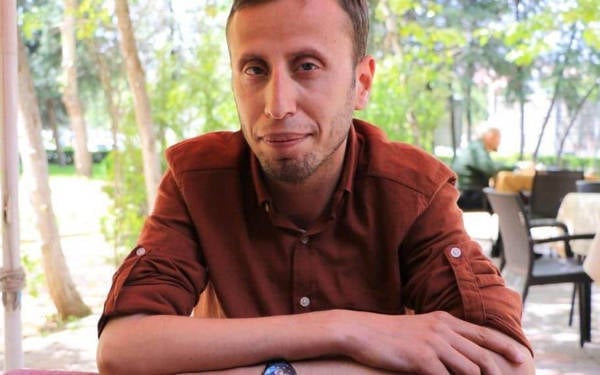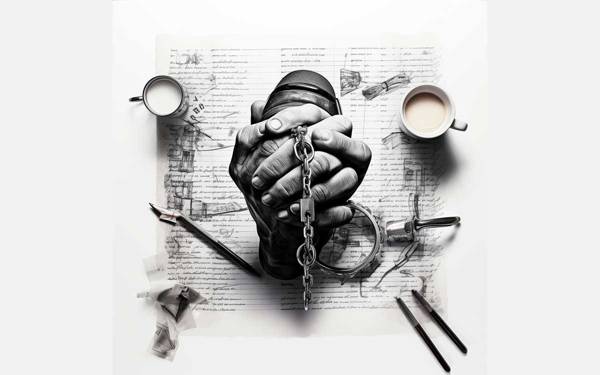Journalist Abdurrahman Gök released after 7 months


In the second hearing of the trial where journalist Abdurrahman Gök is being prosecuted for 'membership in a terrorist organization' and 'terrorist propaganda' charges, held today (December 5), the prosecutor requested Gök's release, taking into account his detention period. The court decided to release Gök with a travel ban.
During the hearing at the 5th Heavy Penal Court in Diyarbakır, Gök was brought to court, accompanied by his lawyers Resul Temur and Mehmet Emin Aktar.
Open witness Ümit Akbıyık, who has given statements and made identifications in more than 800 files connected to the hearing via the Audio and Visual Information System (SEGBİS) to provide his testimony.

Controversial confessor ‘identified 669 suspects in 32 hours’
The trial was attended by Gök's family, representatives from the Dicle Fırat Journalists Association (DFG), Mesopotamia Women Journalists Association (MKG), DISK Press-Work, Media and Law Studies Association (MLSA), Turkey Journalists Union (TGS), representatives from the Southeast Journalists Association (GGC), along with numerous journalists, as well as political party and civil society organization representatives as observers.
False testimony from affiliated witness
Akbıyık claimed to know Gök and asserted that he worked at Pel Production. Akbıyık stated that he saw Gök at Pel Production but couldn't recall the specific date. Akbıyık mentioned, "It was July or August 2020. It was summer. I don't know anything else about the person."
Gök's lawyer, Resul Temur, asked Akbıyık if he was aware of the Kemal Kurkut murder. Akbıyık stated that he knew about it from the press but didn't know who took the photograph. When asked about any observations regarding Gök's health, Akbıyık replied that he had no such observations.
Following this, Gök, addressing the court, stated that Akbıyık's claims were not true. Highlighting his over 20 years of experience as a journalist, Gök said:
"I have been practicing conflict journalism for the past 10 years. I am not an employee of Pel Production; I work for the Mezopotamya Agency (MA). All the evidence presented by the prosecution is related to the news I produced for MA. Even this contradicts his claim. Despite this, he states that he saw me once at Pel Production. In January 2020, I was injured. I even came to these hearings with a cane.
The witness's falsehood has become apparent even here. In 2009, I was a parliamentary correspondent. I went to the Newroz celebrations in Siirt and Diyarbakır. I was arrested for the photos I took during Newroz and released 8 months later. Therefore, I don't think the witness is telling the truth. I saw him for the first time here. There was no statement from him in the file related to me. When the prosecution first showed me these statements, there was nothing. Then, my name appeared in five statements from this witness. I believe he gave his statement under direction."
Gök also spoke about the call records in the indictment, stating, "They are all journalists. Journalists talk among themselves. They discuss news, express condolences. Even a phone call I made while in prison has been added to the file. The Kobanê Documentary has been made the subject of the accusation. The goal of a journalist is to reveal the truth there, and I did that. In Gaza, more than 60 journalists have died. Israel arrests and targets journalists reporting the news. A journalist does not practice journalism in the language of the government."
Following this, lawyer Resul Temur stated that his client did not work at Pel Production. Lawyer Mehmet Emin Aktar, on the other hand, mentioned that the witness is a paid informant for the police. Aktar emphasized that, for this reason, the statements of the witness should not be considered as a basis for the case.
The prosecutor in the trial, taking into account the period of detention, requested the release of Abdurrahman Gök. The court, with the condition of a travel ban, decided to release Gök. The next hearing in the case is scheduled for March 12.
Who is Abdurrahman Gök?
He is a journalist for the Mezopotamya Agency, born in Batman in 1980.
He graduated from the Department of Journalism at Ege University's Faculty of Communication. He has been practicing journalism for over 20 years.
He started working at Dicle News Agency (DİHA) in 2004. Later, he worked for the closed Zarok TV, DiHaber News Agency, and Mezopotamya Agency. His writings were also published on bianet.
Following the coup attempt on July 15, 2016, under the state of emergency declared, DİHA TV, Zarok TV, and DiHaber News Agency were closed with a statutory decree.
In 2011, he directed the documentary "Border and Death." With this documentary, he was awarded the Yılmaz Güney Honor Award in the documentary category at the 2nd Yılmaz Güney Culture and Art Festival held in 2012.
In 2017, during the Newroz celebration in Diyarbakır, he captured moment by moment the killing of university student Kemal Kurkut by the police. His photos were awarded the Metin Göktepe Journalism Awards - Jury Special Award. After the death of Jîna Mahsa Amini, he moved to Iran. There, he contributed to news and article series.
He was present in Sinjar during ISIS attacks and alongside the victims during the Maraş earthquake.
He has been detained multiple times, facing numerous legal cases. Several weeks after the photographs he took capturing the killing of Kemal Korkut, on April 20, 2017, the police raided Gök's house in Bağlar, Diyarbakır. He was tried on charges of "membership in a terrorist organization" and "terrorist propaganda," facing a prison sentence ranging from 7 to 20 years. Diyarbakır 5th Heavy Penal Court sentenced Gök to 1 year, 6 months, and 22 days in prison on June 30, 2022, on the charge of propaganda.
Gök was detained on October 9, 2018, as part of a terrorism investigation conducted in Diyarbakır, along with numerous other journalists. The allegation was that Gök was involved in activities within the press and publication committee of the KCK. The detention procedures lasted for three days. He was released under judicial control on October 12, 2018. The indictment related to Gök was completed approximately two years after being detained and released. He was accused of "being a member of an armed terrorist organization" and "making terrorist propaganda through the press." The prosecution requested prison sentences for Gök ranging from 9 years, 4 months to 15 days to 28 years, 1 month, and 15 days. The trial is ongoing.
On April 25, 2023, Gök was detained along with 128 individuals, including journalists, politicians, lawyers, unionists, artists, and human rights advocates, as part of an investigation led by the Diyarbakır Chief Public Prosecutor's Office.
Following the statement procedures at the police station, he was referred to the court on April 27. Alongside his colleagues Beritan Canözer, Mehmet Şah Oruç, and Remzi Akkaya, he was arrested on charges of "membership in a terrorist organization."
The Diyarbakır Chief Public Prosecutor's Office prepared the indictment in June 2023, consisting of 14 pages and including charges of "membership in a terrorist organization" and "making terrorist propaganda."
As justification for these charges, the prosecution cited books that anyone can order online, the social security registration made by the institution he worked for, and the photographs he took in Northern Syria while covering news. Additionally, the case was built based on the statement of Ümit Akbıyık, who had given statements in over 800 files.
(HA/PE)





.jpg)
.jpg)
